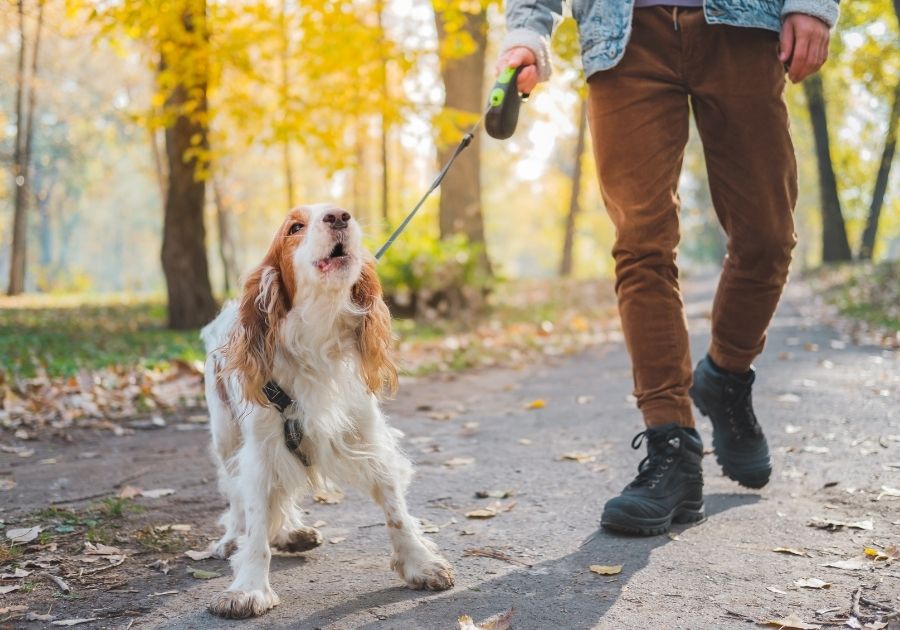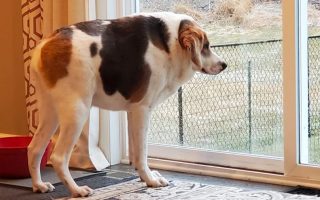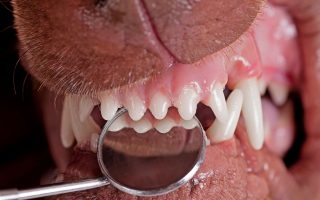Do Dogs Get Hoarse?
When your dog barks excessively, it can result in temporary hoarseness. However, it doesn’t last a long time.
There could be an undiagnosed health condition behind your pup’s hoarse barks if he hasn’t been barking loudly for extended periods before raspy sounds start to kick in.
This article provides the needed information about this condition, and valuable tips on how to treat a dog with a hoarse bark.
What is Hoarseness in Dogs?

Similar to humans, canines use their larynx (a part of the throat usually called “voice box” in humans) to produce sounds such as barking. Dogs can get hoarse when they bark so much and their larynx becomes irritated.
When the larynx is irritated or struck by a disease, it begins to produce raspy sounds that are also muted.
Some of the most common medical causes for hoarse barks in dogs are:
- Poisoning and toxicity
- Laryngeal trauma
- Laryngitis
- Laryngeal paralysis
Taking note of other signs will enable you to determine the reason behind your dog’s hoarse sounds, whether due to excessive barking or a health problem.
Reasons for Hoarse Sounds in Dogs

It becomes an occurrence of great concern if your pup hasn’t spent the day barking endlessly but appears hoarse.
A number of medical conditions affecting the larynx can result in hoarseness in your pooch.
Poisoning and toxicity
Specific plants as well as other household items could potentially lead to toxicity in your dog, thereby causing him to come down with a hoarse voice or bark.
Plants such as the American evergreen, the Flamingo plant, etc. grow naturally in certain environments and can be kept as houseplants.
In the event that your dog eats the aforementioned or other plants, he might suffer from poisoning.
Other signs to be watchful of are airway obstruction, excessive vocalization, vomiting, and diarrhea.
Dive Deeper:
What Toxins Can Cause Seizures In Dogs? Be Careful!
Laryngeal Trauma
An injured neck can cause hoarse, stressed sounds as well as laryngeal trauma in your canine companion.
A jerking movement to the neck or a choke collar can result in injury.
A perforated neck caused by sharp objects such as bones or sticks can cause injuries that will eventually result in the production of hoarse sounds from your pooch.
A neck bite from another animal can also cause your pooch a severe injury that will result in the production of hoarse sounds.
If you suspect that your pooch is severely injured, it is advisable to seek medical assistance right away.
The vet will determine the seriousness of the injury and prescribe the required medication or determine whether or not surgery is needed.
Laryngitis
Laryngitis simply entails that your pooch’s larynx or voice box is inflamed.
This inflammation can be caused by a bacterial infection, fungal infection, viral infection, and inhaled allergens.
Other symptoms to observe include fast heart rate, fever, gums taking on a blue appearance, shortness of breath, and coughing.
Laryngeal Paralysis
Laryngeal paralysis takes effect when there is a weakening of the nerves that control the muscles that hold the larynx tissue and the cartilage collapses inwardly.
The reason for paretic nerves in dogs is yet to be discovered, however, an injured neck or a growing tumor can injure or constrict these nerves.
Although laryngeal paralysis can happen to any breed, regardless of age, Labradors and Irish Setters are more prone to be affected as they grow.
How To Treat A Dog With A Hoarse Bark

Having determined what the reasons and possible causes for hoarseness in dogs are, we will now explore 10 proven tips on how to treat a dog with a hoarse bark.
1. Administer Bronchodilators
Bronchodilators are medications that make breathing less stressful by expanding the airways and soothing the muscles in the lungs.
It can be administered by mouth or injection and is also available in tablet form.
However, if your pet has a heart problem, stomach ulcers, kidney or liver disease, and high blood pressure, bronchodilators should not be administered.
Alternatively, you can talk to your vet about what medications are best suited for your pup’s hoarse bark.
2. Give Your Dog Antibiotics
Similar to human beings, dogs develop bacterial infections that require antibiotic treatment.
Antibacterial treatments and medications are effective in treating these infections, since they destroy the infected organism, thereby leaving your dog’s cells in perfect health condition.
Antibiotics are known to be medications that fight infections caused by bacteria.
They do this by eliminating the bacteria or making it hard for the bacteria to advance or multiply.
If your pooch’s hoarse bark has been caused by a bacterial infection, administering antibiotics is a sure-fire way to get your dog feeling better and back to normal.
3. Replace Dry Food
It might be a good time to replace your dog’s typical dry food with soft moist foods as it might be the reason behind his raspy bark.
Raw honey, for example, is an excellent natural treatment that helps to calm the throat.
Raw honey also contains anti-inflammatory, antiviral, antibacterial, anti-fungal, and antimicrobial properties.
If your pooch is 30 to 50 lbs, you can administer half a teaspoon of honey three to four times each day.
Depending on your fur baby’s size or bodyweight, you can adjust this amount of honey up or down.
4. Replace Your Pup’s Collar
As a pet owner, pulling your dog around using the collar may entail a lot of downsides including hoarse bark in your pooch.
Traditional collars have the potential to harm the neck of your pup if it pulls too hard on the leash.
By constantly jerking the collar, you are potentially destroying the dog’s neck as it is an extremely sensitive area.
Constant stress on a dog’s neck can even result in long-term health problems including damage to the surrounding neck tissue, salivary glands, and the thyroid glands.
A safer replacement for neck collars can be a chest harness which will put little or no strain on the dog’s neck.
5. Reduce Barking
Another effective tip on how to treat your dog’s hoarse bark is encouraging it to reduce barking to a minimum.
Helping your dog to diminish the rate at which it barks in this situation will enable faster recovery of the larynx.
Repeated barking tends to put a strain on your pooch’s voice box, causing inflammation that may worsen your pooch’s hoarse bark.
It is, therefore, advisable to devise measures that will prevent this occurrence from escalating.
Frequently Asked Questions
What should I do if my dog’s bark is hoarse?
You can treat your dog’s hoarse bark with bronchodilators as well as antibiotics.
Use a harness as an alternative to a collar until your pooch’s voice returns to normal.
Can dogs become hoarse from barking?
Yes. Your pup can experience temporary hoarseness if it barks excessively. However, it doesn’t last for a long time.
Dogs use their larynx to produce sounds, such as barking. When the larynx is inflamed or damaged, it can lead to hoarse or muffled sounds.
Why is my dog barking suddenly?
There are many reasons for which dogs bark. Your dog may be barking due to an illness or injury, separation anxiety, attention-seeking, frustration, or alarm.
Dogs also bark in order to establish and maintain their territory.
Dive Deeper:
Why Do Dogs Bark At Nothing? 5 Reasons & Solution
Conclusion
In many cases, you can treat hoarseness in dogs similarly to how you’d treat yourself.
If your pooch has barked to the point of hoarseness, you can calm the throat with a warm tea that contains a little honey and isn’t caffeinated.
Alternatively, if you feel that a health problem may be responsible for your pup’s hoarseness, you must book a vet appointment immediately.
The vet will recommend treatment depending on what they discover.
You May Also Like:
Why Is My Dog Dry Heaving? Causes, Symptoms, Solutions







